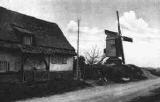High School - more
"For me it was the greatest blessing for which I will always praise God." (NHV I/12v) Whenever Leo Dehon in his memories looks back to the period of Hazebrouck he brings it into similar words.
The prologue to Hazebrouck is quite turbulent: At La Capelle neither parents nor teachers, even less Leo himself are able to handle his temperament and so a school change is inevitable:
"The critical age began for me. I was too much left to myself... It was a bad year. I was lazy... My mother suffered to see me going on this way. Also my father felt a lot of pain. I hid my defects whenever I could. I had a feverish curiosity for the evil. I felt attracted by dancing and society gatherings... I am no longer confident when I am with my mother, and in the family I was often scolded." (NHV I/10r).
The parents' contact with one of the teachers, Rev. Boute, who was once their housekeeper's parish priest, leads to the resolution to send Leo, as well as his brother Henri, to Hazebrouck College.
In a leaflet the director of the college, Rev. Dehaene, presents the program of the school: "We work to educate children by all kinds of exercises suitable to develop the faculties of the soul and the faculties of the body, and especially by religion, heart and torch of the letters, sciences and arts, source and model of all sincere and generous devotions. A paternal monitoring follows the pupil always and everywhere, to educate him to the love of order and duty." (quoted in Mayeur, Lemire, p. 17)
The personalities of the teaching priests, the friendship of some school fellows, the religious spirit of the house, the commitment in different associations, the milieu of Catholic Flanders - all this made Hazebrouck a place, where the young Leo Dehon has religious experiences of an unknown intensity and discovers his vocation to priesthood, of which he says later on: "It is astonishing that from then on my resolve was never seriously shaken." (NHV I/29r)
